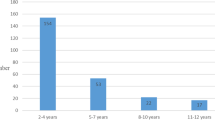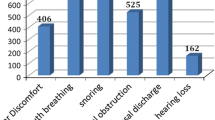Abstract
Objective
This study aimed to evaluate the parental suspicion of hearing loss in children with otitis media with effusion (OME). As part of a population-based survey in a screening programme among 6- to 7-year-old Chinese children in Hong Kong, OME cases and controls were studied for the value of parental observations in the prediction of OME and hearing test results.
Subjects and methods
Prior to the otoscopic and tympanometric examination of the children on school premises, a self-administered binary-choice question was sent to the parents asking whether there was any suspicion of hearing impairment. Positive screens and randomly selected negative screens were seen in a hospital clinic for the confirmation of case and control status 2 to 3 weeks after the school screening. Aural examination under microscopy, repeated tympanometry and stapedial reflex testing, and pure-tone audiometry (PTA) were conducted, and 117 cases and 159 controls were included in this study.
Results
The average PTA conductive threshold levels in the individual children with OME ranged from 3.8 dB to 40.0 dB with a group mean of 17.0 dB in the better-hearing ears. Parental suspicion of hearing deficit was significantly associated with OME (p<0.001) but not PTA findings (p=0.686). The sensitivity of parent-suspected hearing impairment to detect OME however was very low (19.7%).
Discussion
In other words, if we had relied on parental suspicion as the first screening, at least 80% of the OME cases would have been missed. We conclude that the parental suspicion of hearing loss is inadequate for the identification of mild hearing loss as caused by OME. Health education is recommended to improve parental awareness of the disease.

Similar content being viewed by others
Abbreviations
- MEE:
-
Middle ear effusion
- OME:
-
Otitis media with effusion
- PPV:
-
Positive predictive value
- PTA:
-
Pure-tone audiometry
- NPV:
-
Negative predictive value
References
American Academy of Family Physicians, American Academy of Otolaryngology—Head and Neck Surgery, American Academy of Pediatrics Subcommittee on Otitis Media With Effusion (2004) Otitis media with effusion. Pediatrics 113(5):1412–1429
Anteunis LJ, Engel JA, Hendriks JJ, Manni JJ (1999) A longitudinal study of the validity of parental reporting in the detection of otitis media and related hearing impairment in infancy. Audiology 38(2):75–82
Bennett KE, Haggard MP, Silva PA, Stewart IA (2001) Behaviour and developmental effects of otitis media with effusion into the teens. Arch Dis Child 85(2):91–95
Brody R, Rosenfeld RM, Goldsmith AJ, Madell JR (1999) Parents cannot detect mild hearing loss in children. First place—Resident Clinical Science Award 1998. Otolaryngol Head Neck Surg 121(6):681–686
Butler CC, van der Linden MK, MacMillan H, van der Wouden JC (2003) Screening children in the first four years of life to undergo early treatment for otitis media with effusion. Cochrane Database Syst Rev 2:004163
Cantekin EI (1983) Algorithm for diagnosis of otitis media with effusion. Ann Otol Rhinol Laryngol Suppl 92(Suppl 107):6
Downs MP (1980) Identification of children at risk for middle ear effusion problems. Ann Otol Rhinol Laryngol Suppl 89(3 pt 2):168–171
Eliachar I (1978) Audiologic manifestations in otitis media. Otolaryngol Clin North Am 11(3):769–776
Engel J, Anteunis L, Volovics A, Hendriks J, Marres E (2000) Predictive value of parent-reported symptoms in the assessment of otitis media with effusion during infancy. Scand J Prim Health Care 18(1):25–29
Fiellau-Nikolajsen M, Lous J (1979) Prospective tympanometry in 3-year-old children. A study of the spontaneous course of tympanometry types in a nonselected population. Arch Otolaryngol 105(8):461–466
Fria TJ, Cantekin EI, Eichler JA (1985) Hearing acuity of children with otitis media with effusion. Arch Otolaryngol 111(1):10–16
Kontiokari T, Niemela M, Uhari M (1998) Middle ear effusion among children diagnosed and treated actively for acute otitis media. Eur J Pediatr 157(9):731–734
Maw AR, Tiwari RS (1988) Children with glue ear: How do they present? Clin Otolaryngol Allied Sci 13(3):171–177
Northern JL, Downs MP (2002) Hearing in children, 5th edn. Lippincott Williams & Wilkins, Philadelphia
Rosenfeld RM, Goldsmith AJ, Madell JR (1998) How accurate is parent rating of hearing for children with otitis media? Arch Otolaryngol Head Neck Surg 124(9):989–992
Sabo DL, Paradise JL, Kurs-Lasky M, Smith CG (2003) Hearing levels in infants and young children in relation to testing technique, age group, and the presence or absence of middle-ear effusion. Ear Hear 24(1):38–47
Schilder AG, Zielhuis GA, Van Den Broek P (1993) The otological profile of a cohort of Dutch 7.5–8-year-olds. Clin Otolaryngol Allied Sci 18(1):48–54
Silva PA, Kirkland C, Simpson A, Stewart IA, Williams SM (1982) Some developmental and behavioral problems associated with bilateral otitis media with effusion. J Learn Disabil 15(7):417–421
Stewart MG, Ohlms LA, Friedman EM, Sulek M, Duncan NO 3rd, Fernandez AD, Bautista MH (1999) Is parental perception an accurate predictor of childhood hearing loss? A prospective study. Otolaryngol Head Neck Surg 120(3):340–344
Tong MC, Yue V, Ku PK, Lo PS, van Hasselt CA (2000) Screening for otitis media with effusion to measure its prevalence in Chinese children in Hong Kong. Ear Nose Throat J 79(8):626–630
Tong MC, Yue V, Ku PK, Lo PS, Wong EM, van Hasselt CA (2006) Risk factors for otitis media with effusion in Chinese schoolchildren: a nested case–control study and review of the literature. Int J Pediatr Otorhinolaryngol 70(2):213–219
van Cauwenberge P, Watelet JB, Dhooge I (1999) Uncommon and unusual complications of otitis media with effusion. Int J Pediatr Otorhinolaryngol Suppl 49(Suppl 1):S119–S1125
Virolainen E, Puhakka H, Aantaa E, Tuohimaa P, Ruuskanen O, Meurman OH (1980) Prevalence of secretory otitis media in seven to eight year old school children. Ann Otol Rhinol Laryngol Suppl 89(3 Pt 2):7–10
Watkin PM, Baldwin M, Laoide S (1990) Parental suspicion and identification of hearing impairment. Arch Dis Child 65(8):846–850
Zielhuis GA, Gerritsen AA, Gorissen WH, Dekker LJ, Rovers MM, van der Wilt GJ, Ingels K (1998) Hearing deficits at school age; the predictive value of otitis media in infants. Int J Pediatr Otorhinolaryngol 44(3):227–234
Acknowledgement
This study was supported by a grant from the Health Service Research Committee #531021, Hong Kong.
Author information
Authors and Affiliations
Corresponding author
Rights and permissions
About this article
Cite this article
Lo, P.S.Y., Tong, M.C.F., Wong, E.M.C. et al. Parental suspicion of hearing loss in children with otitis media with effusion. Eur J Pediatr 165, 851–857 (2006). https://doi.org/10.1007/s00431-006-0181-5
Received:
Revised:
Accepted:
Published:
Issue Date:
DOI: https://doi.org/10.1007/s00431-006-0181-5




